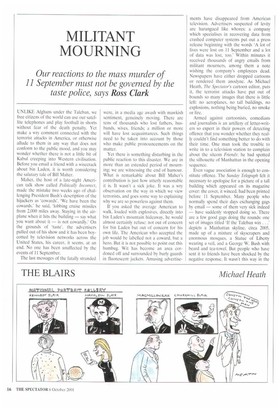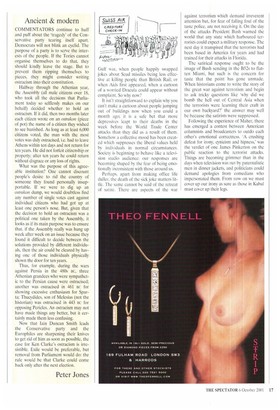MILITANT MOURNING
Our reactions to the mass murder of 11 September must not be governed by the
taste police, says Ross Clark
UNLIKE Afghans under the Taleban, we free citizens of the world can use our satellite telephones and play football in shorts without fear of the death penalty. Yet make a wry comment connected with the terrorist attacks in America, or otherwise allude to them in any way that does not conform to the public mood, and you may wonder whether there is not a little bit of Kabul creeping into Western civilisation. Before you email a friend with a wisecrack about bin Laden, it is worth considering the salutary tale of Bill Maher.
Maher, the host of a late-night American talk show called Politically Incorrect, made the mistake two weeks ago of challenging President Bush's description of the hijackers as 'cowards'. 'We have been the cowards,' he said, 'lobbing cruise missiles from 2,000 miles away. Staying in the airplane when it hits the building — say what you want about it — is not cowardly.' On the grounds of 'taste', the advertisers pulled out of his show and it has been boycotted by television networks across the United States, his career, it seems, at an end. No one has been unaffected by the events of 11 September.
The last messages of the fatally stranded were, in a media age awash with mawkish sentiment, genuinely moving. There are tens of thousands who lost fathers, husbands, wives, friends; a million or more will have lost acquaintances. Such things need to be taken into account by those who make public pronouncements on the matter.
Yet there is something disturbing in the public reaction to this disaster. We are in more than an extended period of mourning: we are witnessing the end of humour. What is remarkable about Bill Maher's contribution is just how utterly reasonable it is. It wasn't a sick joke. It was a wry observation on the way in which we view terrorists, and goes some way to explaining why we are so powerless against them.
If you asked the average American to walk, loaded with explosives, directly into bin Laden's mountain hideaway, he would almost certainly refuse: not out of concern for bin Laden but out of concern for his own life. The American who accepted the job would be labelled not a coward, but a hero. But it is not possible to point out this humbug. Wit has become an area cordoned off and surrounded by burly guards in fluorescent jackets. Amusing advertise ments have disappeared from American television. Advertisers suspected of levity are harangued like whores: a company which specialises in recovering data from crashed computer systems put out a press release beginning with the words 'A lot of lives were lost on 11 September and a lot of data was lost, too.' Within minutes it received thousands of angry emails from militant mourners, among them a note wishing the company's employees dead. Newspapers have either dropped cartoons or rendered them anodyne. As Michael Heath, The Spectator's cartoon editor, puts it, the terrorist attacks have put out of bounds so many images that there is little left: no aeroplanes, no tall buildings, no explosions, nothing being buried, no smoke or fire.
Armed against cartoonists, comedians and journalists is an artillery of letter-writers so expert in their powers of detecting offence that you wonder whether they really couldn't find something better to do with their time. One man took the trouble to write in to a television station to complain about the sitcom Friends: he had spotted the silhouette of Manhattan in the opening sequence.
Even vague association is enough to constitute offence. The Sunday Telegraph felt it necessary to apologise for a picture of a tall building which appeared on its magazine cover: the cover, it winced, had been printed before 11 September. Many people who normally spend their days exchanging gags by email — some of them very sick indeed — have suddenly stopped doing so. There are a few good gags doing the rounds: one set of images titled 'If the Taleban win . . depicts a Manhattan skyline, circa 2005, made up of a mixture of skyscrapers and enormous mosques, a Statue of Liberty wearing a veil, and a George W. Bush with beard and tea-towel. But people who have sent it to friends have been shocked by the negative response. It wasn't this way in the Gulf war, when people happily swapped jokes about Scud missiles being less effective at killing people than British Rail; or when Aids first appeared, when a cartoon of a worried Dracula could appear without complaint. So why now?
It isn't straightforward to explain why you can't make a cartoon about people jumping Out of buildings now when you could a month ago; it is a safe bet that more depressives leapt to their deaths in the week before the World Trade Center attacks than they did as a result of them. Somehow a collective mood has been created which suppresses the liberal values held by individuals in normal circumstances. Society is beginning to behave like a television studio audience: our responses are becoming shaped by the fear of being emotionally inconsistent with those around us.
Perhaps, apart from making office life duller, the death of the sick joke matters little. The same cannot be said of the retreat of satire. There are aspects of the war against terrorism which demand irreverent attention but, for fear of falling foul of the taste police, are not receiving it. On the day of the attacks President Bush warned the world that any state which harboured terrorists could expect a military response. The next day it transpired that the terrorists had been based in America for years and had trained for their attacks in Florida.
The satirical response ought to be the image of Bush sending in the B52s to flatten Miami, but such is the concern for taste that the point has gone unmade. When historians come to write the story of the great war against terrorism and begin to ask tricky questions like 'why did we bomb the hell out of Central Asia when the terrorists were learning their craft in our own backyard?' the answer may well be because the satirists were suppressed.
Following the experience of Maher, there has emerged a contest between American columnists and broadcasters to outdo each other's emotional correctness. 'A crushing defeat for irony, cynicism and hipness,' was the verdict of one James Pinkerton on the public reaction to the terrorist attacks. Things are becoming grimmer than in the days when television was run by paternalistic men in dinner jackets, and politicians could demand apologies from comedians who impersonated them. From now on we must cover up our irony as sure as those in Kabul must cover up their legs.



































































































 Previous page
Previous page